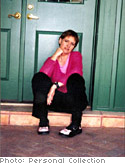Reading Room
Life on the Wire

Antonya Nelson's seductive stories follow women and men in and out of freedom and commitment.
Antonya Nelson's fiction reminds you of what it's like to encounter a gifted storyteller who has a story to tell, who knows precisely how to tell it, and who understands what makes a narrative seem natural, simple—and as complex as life itself. The 13 assured and beguiling tales in her new collection, Female Trouble (Scribner), start off straightforwardly enough. A divorced woman revisiting her Kansas hometown recalls the mythical girl she and her high school friends invented to act out their unruly adolescent impulses and desires. A woman initiates a predictably brief romance with a young man she spots stealing a CD at a neighborhood yard sale. A new mother with marital problems of her own becomes the confidante of a husband and wife, each of whom is involved in a passionate, adulterous affair.But by the time these stories begin to follow unexpected plot turns and expand beyond a particular moment to encompass the entire life of an individual or a family, you may find yourself in a very different place than wherever you'd imagined Antonya Nelson was leading you. Though her tone is low-key, her characters are playing for extremely high stakes as they walk the dizzying high wire between freedom and commitment, between domestic comfort and erotic adventure. Several stories feature suicides and near-suicides, literal and metaphorical rescues from physical harm and from the even more perilous depths of grief and despair. Nelson writes with special acuity about sibling relationships, about the weight of generations and of blood ties so powerful that every gesture and conversation is illuminated and shadowed by the light of a shared childhood and of everything that has happened since.
But finally, what's most appealing about these stories is their perceptiveness—the flashes of intuition and of quick, almost offhand wisdom about how we live now and about the countless small experiences, assumptions, misunderstandings and memories that go into making us who we are. In the title story, a man recalling an old romance wonders: "Was there a word for the way you winced, recalling a former affection, that place in your rib cage that briefly collapsed, your glance that no longer lingered but skimmed over her face like a skipped stone over water?" If there were such a word, Antonya Nelson would surely be the one to find it. — Francine Prose



